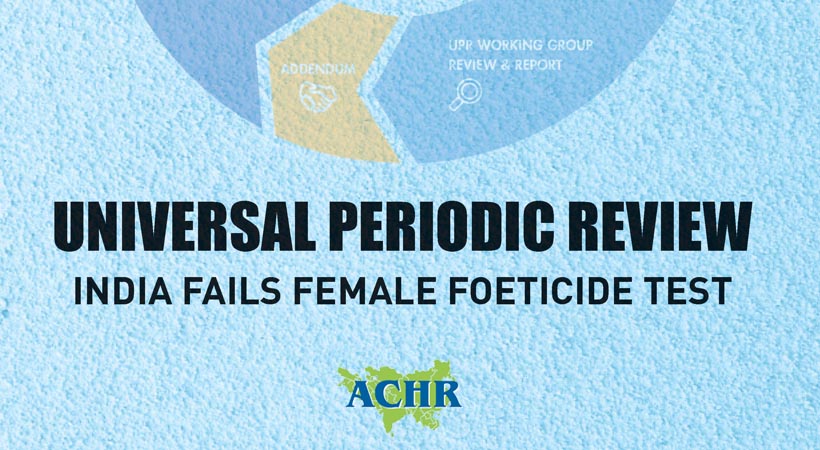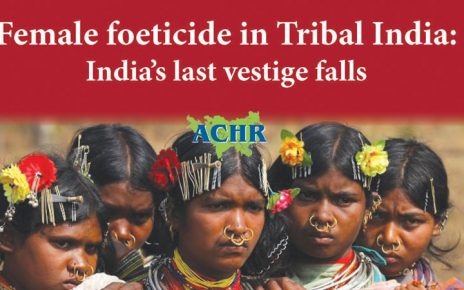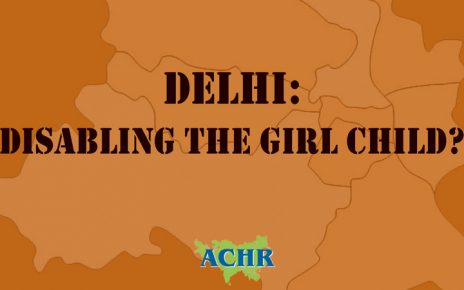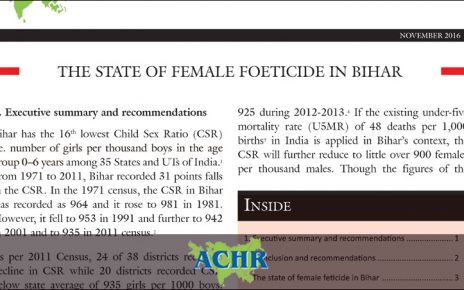This report chronicles as to how the United Nations Human Rights Council considered the issue of female foeticide in India under the Universal Periodic Review (UPR) of India’s human rights record during the third cycle of the UPR held in May 2017.
In its National report, the Government of India raised the issue and that stated, “Although the overall sex ratio has increased by 7 points to reach 940 in Census 2011 as against 933 in Census 2001, the child sex ratio (0-6 years) has shown a sharp decline from 927 females per thousand males in 2001 to 919 females per 1,000 males in 2011. As a result, the Government has intensified its efforts to effectively implement the Pre-Conception and Pre-Natal Diagnostic Techniques (Prohibition of Sex Selection) Act, 1994. The Prime Minister’s Beti Bachao Beti Padao campaign was launched in 2014 with the objective of improving the sex ratio and combating female foeticide.”
In its compilation of the information contained in the reports of the UN treaty bodies, UN special procedures and other relevant United Nations documents relating to India the Office of the United Nations High Commissioner for Human Rights (OHCHR) also covered the issue. The compilation stated,
“The Committee on the Elimination of Discrimination against Women expressed concern at the persistence of harmful traditional practices, such as the high number of dowry deaths, so-called “honour killings”, sex-selective abortion, sati, devadasi and women accused of witchcraft.
The Special Rapporteur noted that customary practices in the family and community pointed to a pattern whereby parents preferred to have sons over daughters. She indicated that research had revealed the declining ratio of girls to boys, and the continuing prevalence of sex-selection practices in some states, despite specific legislation to address the problem.
The country team welcomed greater focus on improving gender outcomes. The flagship Beti Bachao Beti Padhao campaign had been launched in 2015 with the objective of preventing gender-biased sex selection and addressing the imbalance in the gender ratio. Cash incentive schemes to promote education and encourage people to delay marriage had shown varied results and needed to be complemented.”
The Joint Submission of by Asian Centre for Human Rights and others was also covered by the OHCHR in the summary of the Stakeholders and the OHCHR’s summery covered the recommendation of the submission i.e. the launching of pilot schemes on the implementation of the Preconception and Pre-Natal Diagnostic Techniques (Prohibition of Sex Selection) Act in targeted districts and called for a central nodal agency to combat female foeticide – leading to increased accountability, incentivised schemes for girl child and mandatory birth registration focusing on girl child.”
In its advance questions, Czechia asked India which measures has “the Government adopted to prevent and punish traditional harmful practices against women, in particular foeticide, child and forced marriage, marital rape, dowry-related murders and honour killings and to combat discriminatory practices, including the lack of registration and the difficulty in obtaining an identity card, which result in denying women access to essential services?”
Indeed the following two specific recommendations were made at the UPR:
“161.195 Take urgent measures to put an end to harmful traditional practices such as so-called “honour killings”, selective abortion on the basis of the sex of the fetus, sati, devadasi, early and enforced marriage, bringing the perpetrators to justice and guaranteeing assistance for victims (Argentina);
161.196 Implement existing laws on all forms of violence and sexual violence against women and girls, including “honour” crimes, female feticide and female infanticide; expand the definition of rape and sexual assault to include marital rape; and end harmful practices such as child, early and forced marriage (Canada)”.
Regrettably, in its reply India did not accept the recommendations and only “noted” the same.
This once again exposes hollowness of the Government of India’s policy on combating female foeticide in India.




